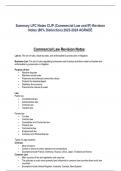Resume
Summary LPC Notes CLIP (Commercial Law and IP) Revision Notes (80% Distinction) AGRADE
- Cours
- Établissement
Summary LPC Notes CLIP (Commercial Law and IP) Revision Notes (80% Distinction) AGRADE Commercial Law Revision Notes Law is: The set of rules, made by state, and enforceable by prosecution or litigation. Business Law: The set of rules regulating businesses and business activities made by thest...
[Montrer plus]



